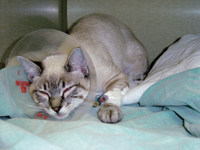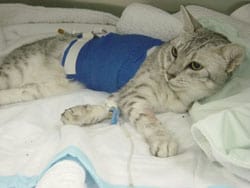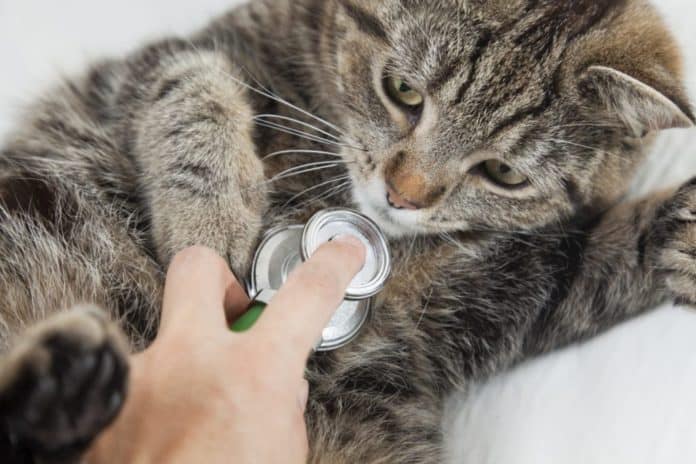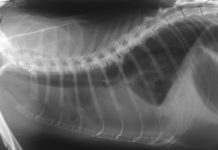Acute abdominal pain or painful abdomen in cats is commonly due to the sudden inflammation of the peritoneum or abdominal tissues. Medically, it is referred to as peritonitis. This particular feline condition causes the fluid to shift through the peritoneal cavity, which leads to austere dehydration and imbalance in the electrolytes. Further, this condition might be because of various infectious causes like stomach flu or non-infectious flu, like hernia. In this article, we will be discussing further what this feline condition is –what causes it, its symptoms, prognosis, and possible treatments. If you want to learn more about it, feel free to give this article a read.
Painful Abdomen in Cats: What is this feline condition?

A pain that’s located in the abdominal area may result from the conditions, which range from trauma up to disease. Therefore, it is very important to take the cat to a vet for some examinations as soon as possible if it is suffering from such kind of condition.
Moreover, there are many reasons why the cat might be experiencing abdominal pain. The cats aren’t normally expressive of themselves, especially when it comes to pain, yet there are some ways in detecting if something is actually wrong in the abdominal area. Due to the fact that the abdomen lies in between the chest and the pelvis, a number of organs may be the perpetrator behind this pain.
Though the younger cats has the tendency to have peritonitis because of infections and traumatic causes, malignant cancers are actually more often the cause of peritonitis in the older cats. Moreover, it is also important to determine any underlying causes of the acute abdominal pain, as the vet might need to perform emergency surgical procedure in resolving it.
Causes of Peritonitis in Cats
Numerous conditions may actually be the cause of painful abdomen in cats. These include the following:
- Feline infectious peritonitis
- Inflammatory bowel disease
- Intestinal obstruction
- Parasites
- Bacterial infection
- Ascites
- Kidney stones
- Dietary intolerance
- Urinary obstruction
- Ruptured bladder
- Poisoning
- Cancer
- Constipation
- Pancreatitis
Symptoms of Peritonitis in Cats
Cats might not always show any signs that will indicate that it is really experiencing an abdominal pain. Furthermore, pain may unfortunately be referred to as another area of the body that is not the real sources as well. It is very important to pay a very close attention to the cat, in order to discover if it’s experiencing any abdominal pain. The major symptoms to watch out for in painful abdomen in cats are the following:
- Weight loss
- Pain or tenderness when touched
- Change in the appearance or posture
- Difficulty in urinating
- Presence of blood in the feces
- Loss of appetite
- Diarrhea
- Vomiting
Prognosis of Peritonitis in Cats
In order to diagnose the condition of a cat, the vet may require a full health history and may also conduct a complete physical examination, which might lead to more diagnostic testing. Further, what you give the veterinarian may help hugely in restricting the potential causes of the condition. Knowing if there’s been any reaction to a certain types of food, contact to various toxic or dangerous substances or cases, and some other symptoms the cat has shown may aid in this particular process.

In the event that the vet has already determined more exams are compulsory, there are several common ones they’ll be conducting. The common analytic testing may include a, urinalysis, and biochemical profile. Furthermore, these three tests are commonly used in checking for any signs of infection or inflammation, and in order to observe how well the organs are working. Additionally, fecal test might also be conducted if parasites are assumed.
The vet might also execute a biopsy or a peritoneal fluid scrutiny that checks the kind of fluid in the abdominal area of the cat if fluid is perceived. Finally, an ultrasound or X-ray of the abdominal area may be taken. All of these scans may discover any tumors, inflammation, kidney stones, or any rifts in the cat’s organs.
Treatments for Peritonitis in Cats
Since there’s a variety of causes for the abdominal pain, treatments for painful abdomen in cats may vary.
Supportive Care
Yonder anti-nausea and pain medication, a supportive care might include an administration of the fluids, in order to treat dehydration. Furthermore, if the cat has a misfortune of being distressed with FIP, some supportive care might be the main treatment, since the viral infection possess a high rate of mortality.
Diet
If there are dietary complications, an alteration in the diet might be the prescribed treatment. Further, the vet may suggest a hypoallergenic kind of diet or an elimination diet. Both of which may help with IBD, and in determining if the cat is experiencing an allergy.
Medication
In case of bacterial infection or parasitic infestation, the vet may prescribe a round of antibiotics or antiparasitic. Moreover, even though these medications might come with risks, the benefits commonly outweigh the concerns. It’s vital that they’re given as recommended so that the cat may reap all the benefits.
Surgery
If tumors or cancer have been spotted, the veterinarian may almost surely suggest surgery in removing it. A surgical operation is also required in case of a burst bladder.









